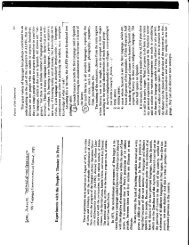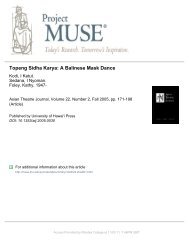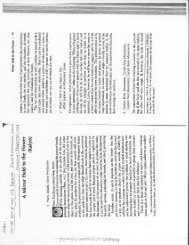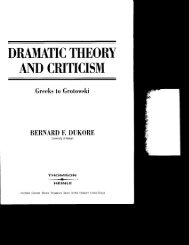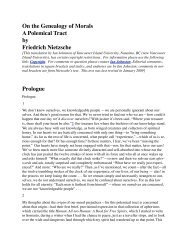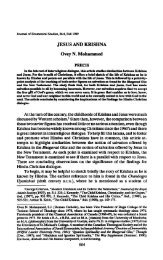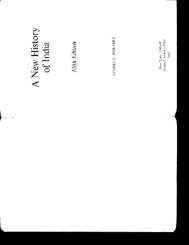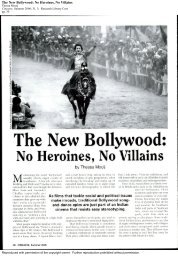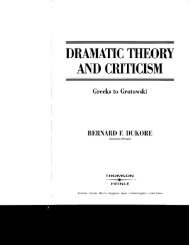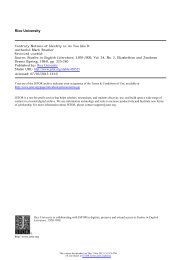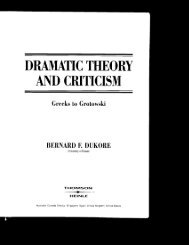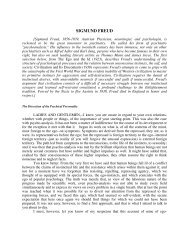Contemporary China - Yavanika
Contemporary China - Yavanika
Contemporary China - Yavanika
You also want an ePaper? Increase the reach of your titles
YUMPU automatically turns print PDFs into web optimized ePapers that Google loves.
EJU, song drama. Flexible<br />
rsical form it was contem-<br />
:egional traditions. It was<br />
middle way between past<br />
ding problem of Chinese<br />
he Nationalist capital at<br />
,llowed Japan's defeat in<br />
:ivil war broke out as the<br />
rltimate power. Crippling<br />
: chaos and social disintee<br />
universities was desperuals<br />
despair.<br />
ame head ofthe Shanghai<br />
School of Dramatic Art.<br />
a local museum and pri<br />
h in theatre was matched<br />
nd stafl Combining class-<br />
Lng experience they susls<br />
of performances for the<br />
ble government support.<br />
lng Shen all taught there<br />
l given up plapvriting for<br />
Yuqian was working for<br />
. Dai Ailian, the dancer,<br />
nited States during this<br />
up her own school in<br />
I the Nationalist governse<br />
key artists stayed on to<br />
rrnment. It was a decision<br />
irge proportion of people<br />
ional and modern theatre<br />
rlic 1949-91: policy<br />
lhinese Conmunist Party<br />
rople's Republic of <strong>China</strong><br />
L Mao Zedong. In 1966 Mao<br />
rltural Revolution in an<br />
Iutionary purity. With his<br />
and the fall of the radical<br />
ng month, economic modd<br />
top prioriry in <strong>China</strong>'s<br />
r the Cultural Revolution<br />
om 1958 on were largely<br />
eatre reflect overall CCP<br />
t there have been substanto<br />
period. However, at no<br />
time has the CCP believed it should relax its concern<br />
with theatre activities altogether. As a result,<br />
the fact of censolship has been conslstent, even<br />
though the extent has varied enormously.<br />
Until 1981, the basic CCP policy and theory of<br />
theatre (and other arts) were those Mao advanced<br />
in his'Talks at the Yan'an Forum on Literature and<br />
Art'. Mao declared there that theatre reflected society<br />
but also influenced it as a means of propaganda,<br />
whether it intended to or not. He held all<br />
theatre as representing the interests ofone class or<br />
another and advocated that it should oppose the<br />
bourgeoisie and favour the masses of workers,<br />
peasants and soldiers. Elsewhere, Mao pushecl for<br />
the critical assimilation oftraditional and foreign<br />
theatres.<br />
In July 1950 the new governmcnt's Ministry of<br />
Culture set up a Drama Reform Committee to<br />
determine precisely how practice in the theatre<br />
should be brought into line with theory. Anong<br />
traditional music dramas it retained those which<br />
emphasized Chinese patliotisrrl, peasant rebellion<br />
or heroism, equality between the sexes, or the<br />
political prominence of women. Newly arranged<br />
dramas on historical themes were expected to<br />
emphasize similar topics. On the other hand, many<br />
items considered<br />
'feudal' and siding with the rich<br />
againsthe poor were banned. \\hile the tnannerisms,<br />
costun-tes and other aspects ofthe traditional<br />
actor's craft were retained, reform demanded the<br />
abolition of sone'unhealthy' usages. No people's<br />
hero should be shown in a position which humiliated<br />
him before a feudal person such as a monk.<br />
Kowtowing and the 'false foot' devised by Wei<br />
Changsheng werc banned. lhe Great Leap Forward<br />
of 1958 gave strong emphasis to dranas of all<br />
forms on contemporary thernes, but did not disc0ufage<br />
traditional themes. Throughout the 1950s<br />
and early 1960s, although the theolies of<br />
Stanislavski were dominant in spoken-drama circles,<br />
those of Bertolt Brecht also had a following,<br />
led by Huang Zuoling of the Shanghai People's fut<br />
Theatre.<br />
At a meeting of heads of CCP Cultural Bureaux<br />
held in April 1963, Mao's wif'e Jiang Qing had a circular<br />
distributed calling for'the suspension ofthe<br />
pertbrmance of ghost plays', by which she meant<br />
any traditional nusic drama or newly arranged<br />
historical item. ln rnid 1964 a Festival of tseijing<br />
Opera on <strong>Contemporary</strong> Themes was held, sig-<br />
nalling the near total disappearance of all such<br />
'ghost plays' fi-on the stage for 13 years. In<br />
February 1966 Jiang Qing hcld a forum on<br />
'Literature and Art in the Armed Forces'which laid<br />
down the line on theatre demanded dr.rring the<br />
Cultural Revolution 11966-76). It followed Mao's<br />
ideas closely in its enphasrs on class and class<br />
strugglc and the mass linc, but placcd an extrenle<br />
interpletation on thelrr.'lhus'clitical assin-rilation'<br />
of tradition meant retention oi little nlore than the<br />
name Beijing opera. All content mr.lst praise the<br />
revolr.rtion and the CCP directly, almost all the tr.aditional<br />
content, mannerisns and costumes were<br />
banncd as espousing feudal ideas and class interests.<br />
The Forun also pushed the notion ofa 'n-rodel'<br />
drama, one which encapsulated perfectly all the<br />
Cultural Revolution's theory of theatrc. Over the<br />
following ycars a small number of these 'n-rodels'<br />
was devised, and professional drama companies<br />
wele allowed to perform more or less nothing else.<br />
One of the main featurcs of the 'models' was their<br />
characterization, which portrayed the heroes as<br />
faultlcss, and the villains as without redeeming<br />
teatures.<br />
Jiang Qing was the leader of the 'gang of four'<br />
and it was not long after theil fall that thc Cultural<br />
Rcvolrition's theatre theorywas discredited. In May<br />
1977 several scenes<br />
ofa newly arranged histolical<br />
drama were restagcd in Beijing. Early the following<br />
year the main power-holder ol the new leadelship,<br />
Deng Xiaoping, gave explicit approval for the<br />
revival of traditional music dramas and these<br />
began to trickle baclt, very quickly becoming a vcritable<br />
torrent rvhich, as of the rnid-90s, shows no<br />
signs of subsiding. Love-stories and patriotic<br />
dramas, as well as those about peasant rebels,<br />
again reccived encouragemcnt and the themc of<br />
rightcd injustice sct in the dynastic pasr becante a<br />
useful propaganda weapon on behalf of lcgal<br />
reform. Hunour again becane a don-rinant part of<br />
the Chinese legional drama, and entertainment<br />
was accepted as a nain purpose oftheatre.<br />
The main linchpin in the CCP's theatre policy is<br />
the need for variety. The range of forn and content<br />
continucd to broaden until 1989, on the whole<br />
with CCP approval. Up till 1989 attempts to hold<br />
back this trend towards liberalization, sucli as the<br />
Campaign against Spilitual Pollution in 1983,<br />
proved shortJived. In 1982 Mao's 'Talks at the<br />
Yan'an Forurn'were partly discredited. ln theory,<br />
: i<br />
&<br />
4l



